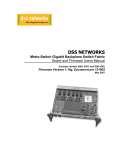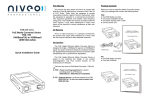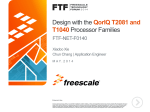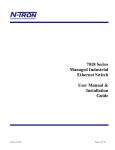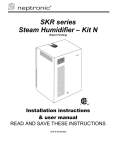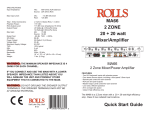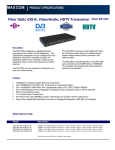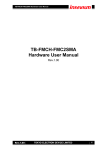Download EOM-G103-PHR-PTP Series Hardware User`s Manual
Transcript
EOM-G103-PHR-PTP Series Hardware User’s Manual First Edition, January 2015 www.moxa.com/product © 2015 Moxa Inc. All rights reserved. EOM-G103-PHR-PTP Series Hardware User’s Manual The software described in this manual is furnished under a license agreement and may be used only in accordance with the terms of that agreement. Copyright Notice © 2015 Moxa Inc., All rights reserved. Trademarks The MOXA logo is a registered trademark of Moxa Inc. All other trademarks or registered marks in this manual belong to their respective manufacturers. Disclaimer Information in this document is subject to change without notice and does not represent a commitment on the part of Moxa. Moxa provides this document as is, without warranty of any kind, either expressed or implied, including, but not limited to, its particular purpose. Moxa reserves the right to make improvements and/or changes to this manual, or to the products and/or the programs described in this manual, at any time. Information provided in this manual is intended to be accurate and reliable. However, Moxa assumes no responsibility for its use, or for any infringements on the rights of third parties that may result from its use. This product might include unintentional technical or typographical errors. Changes are periodically made to the information herein to correct such errors, and these changes are incorporated into new editions of the publication. Technical Support Contact Information www.moxa.com/support Moxa Americas Moxa China (Shanghai office) Toll-free: 1-888-669-2872 Toll-free: 800-820-5036 Tel: +1-714-528-6777 Tel: +86-21-5258-9955 Fax: +1-714-528-6778 Fax: +86-21-5258-5505 Moxa Europe Moxa Asia-Pacific Tel: +49-89-3 70 03 99-0 Tel: +886-2-8919-1230 Fax: +49-89-3 70 03 99-99 Fax: +886-2-8919-1231 Table of Contents 1. Introduction ...................................................................................................................................... 1-1 Overview ........................................................................................................................................... 1-2 Package Checklist ............................................................................................................................... 1-2 Product Features ................................................................................................................................ 1-2 EOM-G103-PHR-PTP Hardware Specifications ......................................................................................... 1-3 EOM-G103-PHR-PTP Hardware Block Diagram ........................................................................................ 1-3 Appearance........................................................................................................................................ 1-4 EOM-G103-PHR-PTP Embedded Module .......................................................................................... 1-4 EOM-G103-PHR-PTP Evaluation Board ............................................................................................ 1-4 Dimensions (unit: mm) ................................................................................................................ 1-5 2. EOM-G103-PHR-PTP Functionality ..................................................................................................... 2-1 EOM-G103-PHR-PTP Embedded Module Functions ................................................................................... 2-2 LAN Ports ................................................................................................................................... 2-2 Console Port ...................................................................................................................................... 2-2 GPIO ................................................................................................................................................. 2-2 Pin Assignments ................................................................................................................................. 2-2 Pin assignment table for JP1 (2 x 40) ............................................................................................. 2-3 Pin assignment table for JP2 (2 x 10) ............................................................................................. 2-3 3. EOM-G103-PHR-PTP-ST Functionality ............................................................................................... 3-1 EOM-G103-PHR-PTP-ST Development Board .......................................................................................... 3-2 Combining the EOM-G103-PHR-PTP-ST with the Embedded Module........................................................... 3-2 LED Indicators .................................................................................................................................... 3-3 Wiring Requirements ........................................................................................................................... 3-4 Connecting the Power ......................................................................................................................... 3-4 LAN Ports and Pin Assignments ............................................................................................................ 3-4 Reset Button ...................................................................................................................................... 3-5 4. PCB Layout and Design Guidelines .................................................................................................... 4-1 General Rules ..................................................................................................................................... 4-2 Power Ground Rules ............................................................................................................................ 4-2 Chassis Ground .................................................................................................................................. 4-2 Magnetic Noise Zone ........................................................................................................................... 4-3 Differential Signal Layout ..................................................................................................................... 4-3 USB Signal Layout .............................................................................................................................. 4-3 Heat Sink Requiremenrs ...................................................................................................................... 4-3 Design Guidelines ............................................................................................................................... 4-4 1 1. Introduction Thank you for purchasing the Moxa EOM-G103-PHR-PTP embedded module. The product’s features include four 10/100 Mbps Ethernet ports and one UART serial port. The EOM-G103-PHR-PTP is ideal as the core module of an industrial embedded system design. The EOM-G103-PHR-PTP Evaluation Kit, which is designed for system and software program development at the system evaluation stage, is also available. The kit includes the EOM-G103-PHR-PTP and EOM-G103-PHR-PTP-ST, which is the carrier board used to evaluate the EOM-G103-PHR-PTP. In this manual, we introduce the hardware features and functions of the EOM-G103-PHR-PTP embedded module and the EOM-G103-PHR-PTP Evaluation Kit. After a brief introduction to the hardware features, the manual focuses on installation and hardware configuration with device interfaces. The following topics are covered in this chapter: Overview Package Checklist Product Features EOM-G103-PHR-PTP Hardware Specifications EOM-G103-PHR-PTP Hardware Block Diagram Appearance EOM-G103-PHR-PTP Embedded Module EOM-G103-PHR-PTP Evaluation Board Dimensions (unit: mm) EOM-G103-PHR-PTP Series Introduction Overview The EOM-G103-PHR-PTP full Gigabit managed redundancy modules are designed for device manufacturers who would like to embed and integrate the advanced functionality of IEC 62439-3 supported modules. The EOM-G103-PHR-PTP embedded modules provide enhanced performance and reliability for certain mission-critical applications, but with minimal effort. IEC 62439-3 Clause 4 (PRP) and IEC 62439-3 Clause 5 (HSR) are the newest standardized redundancy protocols for industrial automation networks where zero recovery time is needed. PRP and HSR are suitable for electrical substation automation and other mission-critical applications that cannot tolerate any system downtime. The EOM-G103-PHR-PTP series modules are compliant with the latest IEC 62439-3 standards and provide an easy and cost-effective integrated solution for adding a redundancy module to a non-IEC 62439-3 supported product. The modules support two IEC 62439-3 Ethernet ports (SGMII (MAC mode) or SERDES(1000Base-X) interface) for constructing PRP or HSR networks and one standard Ethernet port (SGMII (MAC mode) or SERDES(1000Base-X) interface) for connecting with standard IEEE 802.3 Ethernet devices. The EOM-G103-PHR-PTP series also provide an extra SGMII (MAC mode) or SERDES(1000Base-X) interface for building up a local access Ethernet console port to easily maintain, control, and manage certain devices right at the local site. Package Checklist The EOM-G103-PHR-PTP package includes the EOM-G103-PHR-PTP embedded module only. The EOM-G103-PHR-PTP Evaluation Kit is available separately for evaluation purposes. The EOM-G103-PHR-PTP Evaluation Kit package contains the following items: NOTE • One EOM-G103-PHR-PTP embedded module • One EOM-G103-PHR-PTP-ST, the carrier board of the EOM-G103-PHR-PTP evaluation kit • Ethernet cable • USB-IF cable • Universal power adapter • Warranty card Please notify your sales representative if any of the above items are missing or damaged. Product Features The EOM-G103-PHR-PTP embedded module has the following features: • ARM9 32-bit 192 MHz processor • On-board 32 MB RAM, 16 MB flash • Two 10/100/1000Base Ethernet ports for PRP or HSR redundant networks and one 10/100/1000Base Ethernet port for network switching • One UART serial port for console control • Compact size for easy integration at any field site • Full-function evaluation kit for quick evaluation and application development • Wide -40 to 85°C operating temperature 1-2 EOM-G103-PHR-PTP Series Introduction EOM-G103-PHR-PTP Hardware Specifications Technology Standards: IEEE 802.3 for 10BaseT IEEE 802.3u for 100BaseT(X) and 100BaseFX IEEE 802.3ab for 1000BaseT(X) IEEE 802.3z for 1000BaseX Protocols: PRP/HSR Interface Ethernet Ports: 3 10/100/1000Base ports Connectors: 1 connector with 2 x 40 pins, and 1 connector with 2 x 10 pins Console Port: 10/100/1000 Mbps Ethernet console port or USB console GPIO: 3 programmable I/O pins Power Requirements Input Voltage: 3.3 V Input Current: 1.625 W @ 3.3 V Physical Characteristics Dimensions: 80 x 1.6 x 65 mm (3.15 x 0.06 x 2.56 in) Weight: 28.6 g (0.06 lb) Environmental Limits Operating Temperature: -40 to 85°C (-40 to 185°F) Storage Temperature: -40 to 85°C (-40 to 185°F) Ambient Relative Humidity: 5 to 95% (non-condensing) Standards and Certifications EMI: FCC Part 15 Subpart B Class A, EN 55022 Class A, CE Class A Note: Please check Moxa’s website for the most up-to-date certification status. Warranty Warranty Period: 5 years Details: See www.moxa.com/warranty EOM-G103-PHR-PTP Hardware Block Diagram 1-3 EOM-G103-PHR-PTP Series Introduction Appearance EOM-G103-PHR-PTP Embedded Module EOM-G103-PHR-PTP Evaluation Board 1-4 EOM-G103-PHR-PTP Series Introduction Dimensions (unit: mm) 1-5 2 2. EOM-G103-PHR-PTP Functionality In this chapter, we introduce the basic features of the EOM-G103-PHR-PTP embedded module. The following topics are covered in this chapter: EOM-G103-PHR-PTP Embedded Module Functions LAN Ports Console Port GPIO Pin Assignments Pin assignment table for JP1 (2 x 40) Pin assignment table for JP2 (2 x 10) EOM-G103-PHR-PTP Series EOM-G103-PHR-PTP Functionality EOM-G103-PHR-PTP Embedded Module Functions LAN Ports The EOM-G103-PHR-PTP embedded module has three 10/100/1000 Mbps SGMII (MAC mode) / SERDES (1000Base-X) LAN ports that can be used to set up a redundant PRP/HSR network. Console Port The EOM-G103-PHR-PTP embedded module has 1 10/100/1000 Mbps Ethernet console port or USB console port for onsite configuration. GPIO The EOM-G103-PHR-PTP embedded module provides 3 software-selectable GPIOs with one input and two outputs. The GPIOs give users the ability to design customized functionality. Pin Assignments 2-2 EOM-G103-PHR-PTP Series EOM-G103-PHR-PTP Functionality Pin assignment table for JP1 (2 x 40) Pin Signal Pin Signal Pin Signal Pin Signal 1 GND 2 GND 41 PRP_LED 42 DI 3 DTR(UART) 4 DCD(UART) 43 FAULT_LED 44 Reserved 5 RTS(UART) 6 DSR(UART) 45 STAT_R_LED 46 Reserved 7 TXD(UART) 8 CTS(UART) 47 STAT_G_LED 48 Reserved 9 GND 10 RXD(UART) 49 TX_DIS_G3(SFP) 50 GND 11 GXB_RX_P_0(SGMII) 12 GND 51 PRESENT_G3(SFP) 52 Reserved 13 GXB_RX_N_0(SGMII) 14 GXB_TX_P0(SGMII) 53 LOS_G3(SFP) 54 Reserved 15 GND 16 GXB_TX_N0(SGMII) 55 TX_DIS_G2(SFP) 56 GND 17 GXB_RX_P_1(SGMII) 18 GND 57 PRESENT_G2(SFP) 58 SDA-(I2C) 19 GXB_RX_N_1(SGMII) 20 GXB_TX_P1(SGMII) 59 LOS_G2(SFP) 60 SCK-(I2C) 21 GND 22 GXB_TX_N1(SGMII) 61 TX_DIS_G1(SFP) 62 GND 23 GXB_RX_P_2(SGMII) 24 GND 63 PRESENT_G1(SFP) 64 MDIO-PHY(SMI) 25 GXB_RX_N_2(SGMII) 26 GXB_TX_P2(SGMII) 65 LOS_G1(SFP) 66 MDC-PHY(SMI) 27 GND 28 GXB_TX_N2(SGMII) 67 TX_DIS_G0(SFP) 68 GND 29 GXB_RX_P_3(SGMII) 30 GND 69 PRESENT_G0(SFP) 70 Reserved 31 GXB_RX_N_3(SGMII) 32 GXB_TX_P3(SGMII) 71 LOS_G0(SFP) 72 Reserved 33 GND 34 GXB_TX_N3(SGMII) 73 Reserved 74 GND 35 COUP_LED 36 GND 75 Reserved 76 USB-HOST-DP 37 QB_LED 38 DO(1) 77 Reserved 78 USB-HOST-DM 39 HSR_LED 40 DO(0) 79 Reserved 80 GND Pin assignment table for JP2 (2 x 10) Pin Signal Pin Signal 1 Reserved 2 Reserved 3 Reserved 4 Reserved 5 Reserved 6 Reserved 7 3.3V 8 3.3V 9 3.3V 10 3.3V 11 3.3V 12 GND 13 GND 14 GND 15 GND 16 GND 17 Reset_PHY 18 Reset 19 Reserved 20 Reset to Default Signal JP1 pin# Pin Name Pin Type Description SGMII/SerDes 11 GXB_RX_P_0 I Port A.Receive pairs.Differential Input data. 13 GXB_RX_N_0 14 GXB_TX_P_0 O Port A.Transmit pairs.Differential Output data. 16 GXB_TX_N_0 17 GXB_RX_P_1 I Port B.Receive pairs.Differential Input data. 19 GXB_RX_N_1 20 GXB_TX_P_1 O Port B.Transmit pairs.Differential Output data. 22 GXB_TX_N_1 23 GXB_RX_P_2 I InterLink.Receive pairs.Differential Input data. 25 GXB_RX_N_2 26 GXB_TX_P_2 O InterLink.Transmit pairs.Differential Output data. 28 GXB_TX_N_2 29 GXB_RX_P_3 I Ethernet cosnsole.Receive pairs.Differential Input 2-3 EOM-G103-PHR-PTP Series UART LED indication EOM-G103-PHR-PTP Functionality 31 GXB_RX_N_3 data. 32 GXB_TX_P_3 34 GXB_TX_N_3 4 DCD I 7 TXD O Serial output data. It operate at 3.3V. 10 RXD I Serial input data. It operate at 3.3V. 3 DTR O Data terminal ready. It operate at 3.3V. 6 DSR I Data set ready. It operate at 3.3V. 5 RTS O Request to send. It operate at 3.3V. 8 CTS I Clear to send. It operate at 3.3V. 39 HSR_LED O O Ethernet cosnsole.Transmit pairs.Differential Output data. Data carrier detect. It operate at 3.3V. HSR Mode status LED. Active Low. It operate at 3.3V. 41 PRP_LED O PRP Mode status LED. Active High. It operate at 43 FAULT_LED O Fault indication LED. Active Low.The system is 3.3V. operating abnormally. It operate at 3.3V. 45 STAT_R_LED O System information LED. Active Low. The System has passed self-diagnosis test on boot-up and is ready to run. It operate at 3.3V. 47 STAT_G_LED O System information LED. Active Low. The System has failed self-diagnosis test on boot-up and is ready to run. It operate at 3.3V. FIBER_TX_DISA 67 TX_DIS_G0 BLE 61 TX_DIS_G1 O The TX_DISABLE signal is high to turn off the laser output. The laser will turn on when TX_DISABLE is 55 TX_DIS_G2 low.Active Low. G0(port A). G1(port B). 49 TX_DIS_G3 G2(InterLink). G3(Ethernet Console).It operate at 3.3V. FIBER_PRESENT 69 PRESENT_G0 I SFP module Detect. Active low. Singal-ended input 63 PRESENT_G1 reference signal from fiber optical module. This 57 PRESENT_G2 pins must be pull high 4.7Kohm. G0(port A). 51 PRESENT_G3 G1(port B). G2(InterLink). G3(Ethernet 71 LOS_G0 65 LOS_G1 reference signal from fiber optical module. This 59 LOS_G2 pins must be pull high 4.7Kohm.G0(port 53 LOS_G3 A),G1(port B),G2(InterLink),G3(Ethernet Console).It operate at 3.3V. Fiber_LOS I Fiber Signal Detect. Active low. Singal-ended input Console). It operate at 3.3V. MII 64 MDIO-PHY I/O PU Management data I/O. It operate at 3.3V. The Management input data value on the MDIO pin is valid and Interface latched on the rising edge of MDC. 66 MDC-PHY O Management data clock. It operate at 3.3V. The chip sources a 2MHz clock to the external Phy device I2C USB interface 58 SDA I/O PU Serial data line. It operate at 3.3V. 60 SCK O Serial data clock. It operate at 3.3V. 76 USB-HOST-DP I/O USB Data +. Host side. 78 USB-HOST-D I/O USB Data -. Host side. O General Purpose Output. It operate at 3.3V. I General Purpose Input. It operate at 3.3V. M Digatal output Digatal input 38 DO(1) 40 DO(0) 42 DI 2-4 EOM-G103-PHR-PTP Series POWER 1,2,9,12,1 EOM-G103-PHR-PTP Functionality GND GND Ground. 5,18,21,24 ,27,30,33, 36,50,56,6 2,68,74,80 Reserved 35,37,44,4 Do Not Connect. These pins should not be 6,48,52,54 connected. Do not connect these pins together. ,70,72,73, 75,77,79 Signal JP2 pin# Pin Name Pin Type Description Reset 17 Reset_PHY O Active Low. Reset the PHY chip. It operate at 3.3V. 18 Reset I Active Low. Reset the MOXA module. It operate at 20 Reset to I Active Low. The low status for five continuous 3.3V. Default seconds to load the factory default settings. It operate at 3.3V. Power 7 - 11 3.3V PWR 12 -16 GND GND Reserved 1-6,19 Reserved POWER. 3.3V. Ground. Do Not Connect. These pins should not be connected. Do not connect these pins together. Type Description I Input O Output I/O Input/Output PWR POWER GND GROUND PU Internal pull-up resistor 2-5 3 3. EOM-G103-PHR-PTP-ST Functionality This chapter includes information about the EOM-G103-PHR-PTP-ST (carrier board of the EOM-G103-PHR-PTP Evaluation Kit). The following topics are covered in this chapter: EOM-G103-PHR-PTP-ST Development Board Combining the EOM-G103-PHR-PTP-ST with the Embedded Module LED Indicators Wiring Requirements Connecting the Power LAN Ports and Pin Assignments Reset Button EOM-G103-PHR-PTP Series EOM-G103-PHR-PTP-ST Functionality EOM-G103-PHR-PTP-ST Development Board The EOM-G103-PHR-PTP Evaluation Kit is a PCB board a with complete layout. The kit helps users evaluate, develop, and integrate the EOM-G103-PHR-PTP embedded module into their systems and applications. Simply combine the EOM-G103-PHR-PTP embedded module with the Evaluation Kit to start porting the relevant software, and create a solution for the applications you wish to implement. Number Description 1 Terminal block for DI and Relay 2 USB storage port(ABC-02-USB-T) 3 USB console port 4 Reset to factory default by pressing and hold the button for 5 seconds 5 Ethernet Console port: 10/100/1000BaseT(X) 6 Interlink port: 10/100/1000BaseT(X) 7 PRP/HSR redundant port A: 10/100/1000BaseT(X) 8 PRP/HSR redundant port B: 10/100/1000BaseT(X) 9 Interlink port: 100/1000BaseFX 10 PRP/HSR redundant port A: 100/1000BaseFX 11 PRP/HSR redundant port B: 100/1000BaseFX 24 System reboot 25 DO(1) (LED Display) 26 Power input Combining the EOM-G103-PHR-PTP-ST with the Embedded Module Insert the EOM-G103-PHR-PTP embedded module vertically onto the EOM-G103-PHR-PTP-ST. Note that the Pin marked “JP1 and JP2” on the embedded module must be matched with the Pin marked “JP4 and JP5” on the EOM-G103-PHR-PTP-ST. Be careful when installing the board to avoid damaging the pins. 3-2 EOM-G103-PHR-PTP Series EOM-G103-PHR-PTP-ST Functionality LED Indicators Number LED Color State 22 PWR 1 amber ON Description Power is being supplied to the main system’s power input PWR1 Power is not being supplied to the main system’s power OFF 20 STATE green input PWR1 System has passed self-diagnosis test on boot-up and is ON ready to run 1. System is undergoing the self-diagnosis test 2. System detects the ABC-02 USB plugged into the USB storage port 3. Blinks once per second when pressing the reset button blinking for 5 seconds 4. Blinks rapidly when the reset button has been pressed continuously for 5 seconds, indicating that the device will be reset to factory defaults System failed self-diagnosis on boot-up. • RAM Test Fail / System Info. Read Fail / Switch Initial Fail red ON / PTP PHY Error. • FW Checksum Fail / Uncompress Fail (+ Green Coupler lit on: SW FAIL) 1. System has failed, or is under quick inspection 21 FAULT red ON 2. The relay signal contact is open 3. ABC-02 loading/saving failure OFF 18 19 12(Console) PRP HSR Link/Act/ green green The system is operating normally ON PRP is working OFF PRP is not enabled ON HSR is working OFF HSR is not enabled green 13(Interlink) Speed When there is a secure connection (or link) to a 1000 Mbps ON 14(A) device on any port. 15(B) blinking amber When data is being transmitted or received at 1000 Mbps. When there is a secure connection (or link) to 10/100 ON Mbps Ethernet device on any port. When data is being transmitted or received at 10/100 blinking Mbps. OFF Link down or no link 3-3 EOM-G103-PHR-PTP Series EOM-G103-PHR-PTP-ST Functionality Wiring Requirements In this section, we describe how to connect the EOM-G103-PHR-PTP Evaluation Kit to devices. Read the following safety precautions before proceeding with the installation of any electronic device: • Use separate paths to route wiring for power and devices. If power wiring and device wiring paths must cross, make sure the wires are perpendicular at the intersection point. NOTE: Do not run signal or communication wiring and power wiring in the same wire conduit. To avoid interference, wires with different signal characteristics should be routed separately. • Use the type of signal transmitted through a wire to determine which wires should be kept separate. The rule of thumb is that wiring that shares similar electrical characteristics can be bundled together. • Keep input wiring and output wiring separate. • It is advisable to label the wiring to all devices in the system. • Be sure to disconnect the power cord before installing and/or wiring your EOM-G103-PHR-PTP Evaluation Kit. ATTENTION Safety First! Be sure to disconnect the power cord before installing and/or wiring your EOM-G103-PHR-PTP Evaluation Kit. Connecting the Power You may use the power jack for connecting the power. The power input range of the EOM-G103-PHR-PTP Evaluation Kit is from 12 VDC. If the power is properly supplied, the “Power” LED will light up in yellow after 3 to 5 seconds. Power Ground Rules: Do not split the ground plane into separate planes for analog, digital, and power pins. A single, contiguous ground plane is recommended. • Route high-speed signals above a solid and unbroken ground plane. • Fill copper in the unused area of signal planes and connect these coppers to the ground plane through vias. • Stagger the placement of vias to avoid creating long gap in the plane due to via voids. LAN Ports and Pin Assignments The EOM-G103-PHR-PTP Evaluation Kit has four 10/100/1000 Mbps LAN ports for connecting to a network. The LAN ports use 8-pin RJ45 connectors. See the following diagram for the pinouts. 8-pin RJ45 Pin Signal 1 TRD(0)+ 2 TRD(0)- 3 TRD(1)+ 4 TRD(2)+ 5 TRD(2)– 6 TRD(1)- 7 TRD(3)+ 8 TRD(3)– 3-4 EOM-G103-PHR-PTP Series EOM-G103-PHR-PTP-ST Functionality Reset Button The EOM-G103-PHR-PTP Evaluation Kit has two reset buttons: Manual Reset and Reset to Default. Press the Manual Reset button to reset the hardware of the EOM-G103-PHR-PTP Evaluation Kit and the EOM-G103-PHR-PTP embedded module. Press the Reset button continuously for at least 5 seconds to load the software factory default configuration. After the factory default configuration has been loaded, the system will reboot automatically. 3-5 4 4. PCB Layout and Design Guidelines This chapter includes information about using the EOM-G103-PHR-PTP embedded module to design products that comply with the EMI standard. The printed circuit board is the single most important factor that affects EMI and overall performance. In order to meet these requirements, it depends on good design practices. The goal here is to minimize digital and common mode noise as well as to provide shielding between the PCB’s internal circuitry and the external environment. These PCB design practices should apply to the entire PCB design. The following topics are covered in this chapter: General Rules Power Ground Rules Chassis Ground Magnetic Noise Zone Differential Signal Layout USB Signal Layout Heat Sink Requiremenrs Design Guidelines EOM-G103-PHR-PTP Series PCB Layout and Design Guidelines General Rules • Place components so as to avoid long loop traces. • Use a metal box to shield the printed circuit board. • Use a ferrite core on the DC power cord to reduce EMI. • Provide controlled impedance on all high-speed digital signal traces with the right termination schemes to prevent reflection and ringing. • Ensure that the power line is rated for the application and optimized with decoupling capacitors. • Keep power and ground noise under 100 mV peak to peak. • Ensure that the switching DC-DC converter is filtered and properly shielded as the DC-DC power converter • Avoid via and pad in the path on any critical signal as via and pad will induce unwanted capacitance and can produce a great deal of EMI noise. inductance which can cause reflection and distortion. Power Ground Rules • Do not split the ground plane into separate planes for analog, digital, and power pins. A single, contiguous ground plane is recommended. • Route high-speed signals above a solid and unbroken ground plane. • Fill copper in the unused area of signal planes and connect these coppers to the ground plane through vias. • Stagger the placement of vias to avoid creating long gap in the plane due to via voids. Chassis Ground The chassis ground and magnetics serve two purposes: they help to reduce EMI noise emissions from the signal ground plane to the PCB’s external environment, and act as a shield to protect the PCB components from ESD. Place the chassis ground on all PCB layers and use connection mounting holes to join the chassis ground on different PCB layers The chassis ground on the PCB is directly connected to the metal shield of the equipment through the connection mounting holes. Use a trench/moat to isolate the chassis ground plane from the signal ground plane. The chassis ground region extends from the front edge of the PCB board (RJ45 connectors) to the magnetics and around the edge of the board as shown below. 4-2 EOM-G103-PHR-PTP Series PCB Layout and Design Guidelines Magnetic Noise Zone • Void both power and ground planes on all PCB layers directly under the magnetics. • The chassis ground should extend from the magnetics to the RJ45 connector. • Do not route any digital signals between the PHY and RJ45 connector. • Add transformer to Port 1 and Port 2 as shown in figure 3 when connecting to external cable is required. Differential Signal Layout • Differential pair (GXB_TX_P/N or GXB_RX_P/N) should be routed away from all other signals and keeps 100 ohms differential Impedance. • Keep both traces of each differential pair as identical to each other as possible. • Route each differential pair on the same PCB layer. • Route both (GXB_TX_P/N or GXB_RX_P/N) pairs far away from each other at least 20 mil space as shown below. • The transmit, receive, and clock signals should be kept away from each other. • Do not space single-ended and differential pair traces close than threes the height above the nearest plane USB Signal Layout The following layout guidelines apply to the USB_DP and USB_DM differential pair signals: • Route the signals close to each other as parallel traces on the PCB, and not parallel with other non-USB signal traces to minimize crosstalk. • Doubling the space from the USB_DP/USB_DM signal pair to adjacent signal traces helps prevent crosstalk. Do not worry about crosstalk between the two USB_DP/USB_DM signal traces. Also can adopt the ground guard get up the USB_DP/USB_DM signal pair wrapping to decrease crosstalk and EMI. • The USB_DP/USB_DM signal traces must also be the same length. This minimizes the effect of common mode current on EMI. Lastly do not route over plane splits. • The trace impedance for the USB_DP/USB_DM signals should be 45W±10% (to ground). The impedance is 90W±10% between the differential signal pairs USB_DP and USB_DM to match the 90W±10% USB twisted pair cable impedance. The trace impedance can be controlled by carefully selecting the line width, trace distance from power or ground planes, and physical proximity of nearby traces. • Do not forget the USB data line must be make the impedance matching finally, to avoid the signal reflection. • Minimize the length of high-speed clock and periodic signal traces that run parallel to high speed USB signal • Based on EMI testing experience, the minimum suggested spacing to clock signals is 50 mils. • Based on simulation data, use 20-mil minimum spacing between high-speed USB signal pairs and other lines to minimize crosstalk. signal traces for optimal signal quality. This helps to prevent crosstalk Heat Sink Requiremenrs Chip Part reference Tc (case temperature) MOXA ART U16 109°C (228.2°F) FPGA EP4CGX75CF23I7N P1 90°C (194°F) 4-3 EOM-G103-PHR-PTP Series PCB Layout and Design Guidelines Design Guidelines You may quickly enable the PRP/HSR function on the System by integrating the EOM-G103-PHR-PTP Series to the main system board. The configuration and communication interfaces between the system main board and EOM-G103-PHR-PTP module are UART and SGMII (MAC mode) and SERDES (1000Base-X), respectively. All management and IP-based functions are activated by the System main board and the EOM-G103-PHR-PTP series provide several functions, including PRP/HSR redundancy protocols, VLAN filtering, Multicast filtering, and time zone settings (refer to the user’s manual for details). 4-4























